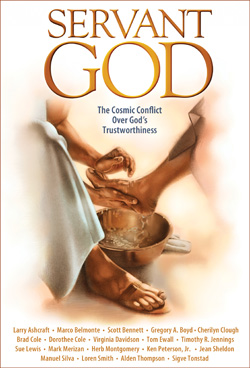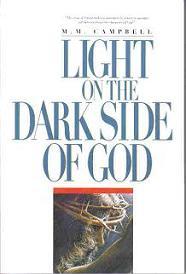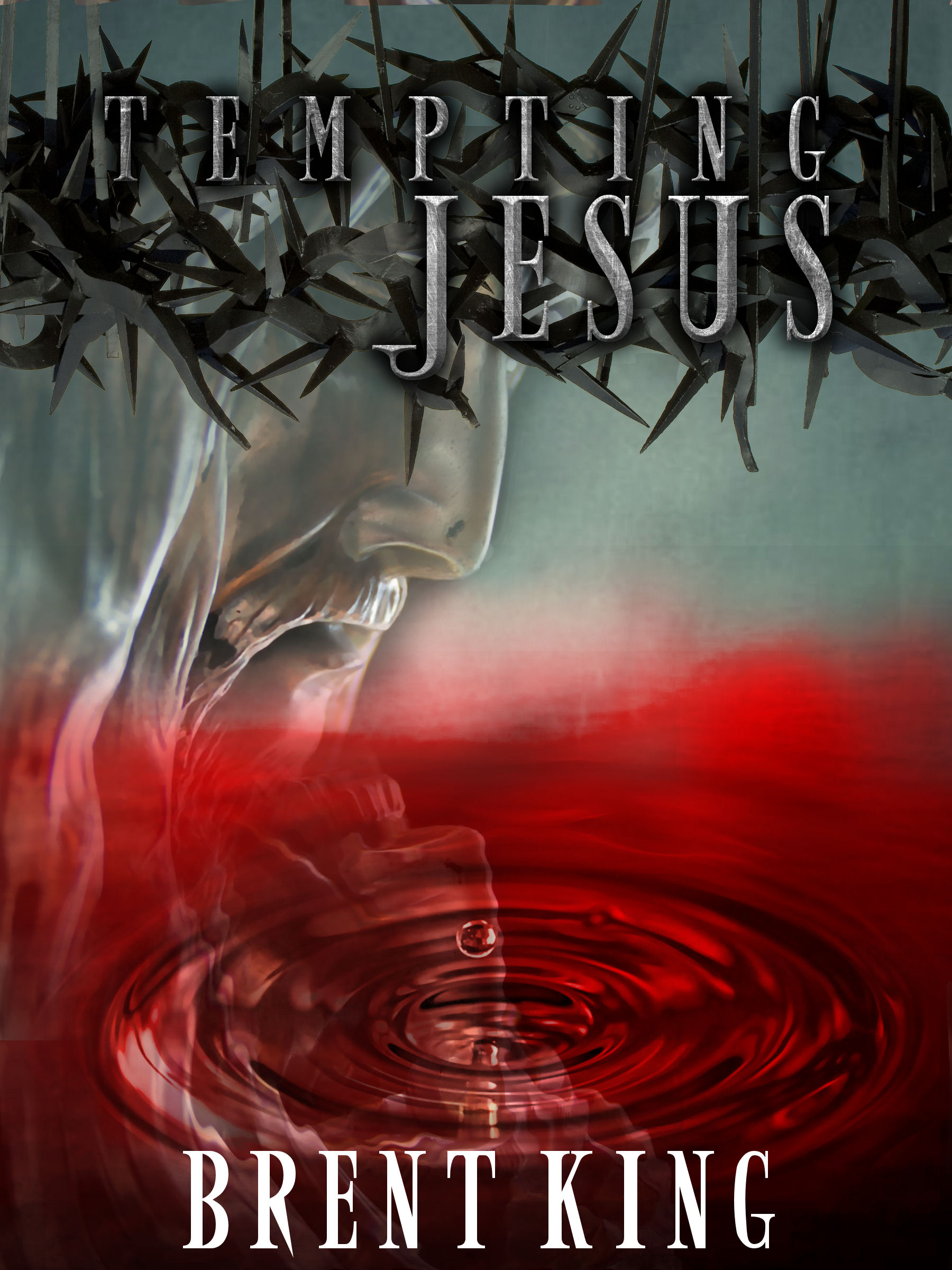My Violent Picture
 The problem with my view of God—my violent picture of Him—was how I saw the plan of salvation. The picture I saw is common to Christianity, one that works like a court of law. This was my understanding:
The problem with my view of God—my violent picture of Him—was how I saw the plan of salvation. The picture I saw is common to Christianity, one that works like a court of law. This was my understanding:
My Legal (Imposed Law) Model
- As the Sovereign creator of all things, God has given commands and laws that must be obeyed
- All men have broken God’s laws and must be punished
- Hell fire is the penalty for this offense
- God is the executioner of this penalty
- Men need pardon to escape punishment
- God’s innocent Son came and paid, on man’s behalf, the penalty that the Father required for the breaking of His law
- All who accept Christ’s payment for them will not be punished
Unfortunately, this understanding didn’t do me any favors. I jumped to some horrible conclusions:
- If God requires the blood of Jesus as payment before He will forgive, then the Father is not forgiving like Jesus
- God requires appeasement with the blood of an innocent victim, just like the heathen gods of old
- God is horribly severe. Eternal death by fire is an incredibly harsh sentence for a few years of violating God’s imposed laws
- Thank God we have Jesus, because God the Father is arbitrary, exacting, vengeful, unforgiving, violent, and severe
Painting A Violent Picture
As you can see, the violent picture of the Father that I grew up with puts Him in a very bad light. It made Jesus look really good, but the Father—not so much. The picture still returns to haunt me: the Father striking the Shepherd, demanding the innocent blood of His Son to appease His wrath toward sin and sinners.
And to make matters worse, I participated. I presented Christ’s blood to the Father to adjust my legal standing and gain God’s favor and mercy.
Basically, I made the blood of Jesus into something enchanting, something I could bartered to get what I wanted, as if there were something magical in the blood itself. However, if this were exclusively about some mysterious power in Jesus’ blood, then He could have died among the infants in Bethlehem and paid the price for our sin. Yet it’s what the blood tells us about God—what it stands for alongside His life—that really matters.
“For the message about Christ’s death on the cross is nonsense to those who are being lost; but for us who are being saved it is God’s power.” 1 Corintians 1:18 GNT, emphasis mine
So you can see that my view of salvation was no better than a pagan’s, whose sacrificial rites and blood sacrifices are needed to appease the wrath of the gods. Appeasing God with the blood of Jesus is no different. It had me constantly afraid of God and often running from Him.
The Light Came Slowly
For many years I was a victim of the Penal Substitution Model of salvation. I didn’t know any other way of thinking and, truthfully, I didn’t realize the damage it was doing to my soul. Then—slowly—light began to dawn. It came in the contemplation of some critical questions:
- Does God Need Sacrifice?
Throughout the Bible there are many texts that say that God doesn’t desire sacrifice. One of the most striking ones is in Psalm 40:6: “Sacrifice and offering You did not desire; My ears You have opened. Burnt offering and sin offering You did not require.” It is clear that God hated Israel’s mindless, gratuitous sacrifices. Indeed, this misconception has done a lot to foster a violent picture of God. Gradually I began to see that God does not require a sacrifice to appease Him before He can forgive.
The Bible simply doesn’t teach this. Quite to the contrary, when Jesus came teaching God’s free forgiveness, His love for all people, and His disregard the entire sacrificial system, the religious people couldn’t handle the dismantling of their theological framework—and they killed Him. We do the same thing to Him today.
It was what the blood of lambs—the blood of the Lamb—symbolized that mattered: the death of Jesus that would defeat sin, death, and the devil by answering critical questions about God’s character that could only be answered by the death of God. Answering these questions brings many would-be rebels to what God really wants instead of sacrifice: a trusting friendship.
- Who Ran?
The Bible does not teach that God separated Himself from humanity because of sin. He is not so holy that He cannot look on sin. Our sin does not offend him or make Him angry with us, so that He stays away. I couldn’t really believe this until I thought of sin as the sickness that it really is. If your son was horribly sick, how would you respond? With disgust and offense? With anger? Would you leave his bedside and stay away? When I thought of it this way, I realized that, despite my feelings, there is no gulf between God and man that needs to be bridged. Sin makes us feel that way—like God has forsaken us—but it is not true.
I have run from God, but They have never left me. I am God’s temple, and They are here. To be healed is to see past the lie that They are not and the lie that They are too holy to look on my sin. Reconciliation is not God finally doing something so They can return to us. No. It is seeing the truth that God has never left us or forsaken us in the first place. All three have always been with us. The only thing that has ever stood between us is a lie.
“The truth is that we have never been separated from the Father, Son, and Spirit. The assumption of separation is the great darkness.” – C Baxter Kruger
“It is said that God cannot be where sin is. But we see in Christ that this is exactly where he was. He walks through the streets, filled with death and loneliness, and kneels beside the empty faces. It is sin that cannot be where God is. It is our dysfunction, our hypocrisy and hurt that can’t remain when we are with Him.” – Derek Flood
The twist: Romans 1:24 says that at some point God gives sinners up; withdraws from them. As we have seen above, this cannot be God turning away or withdrawing. It is God allowing us to turn away, God respecting our freedom of choice. So the sinner retreats into the abyss of Satan’s lies and shuts God so totally out that they cannot hear or respond to God, even though He is near. They turn away toward the lie so thoroughly and believe it so fully that the truth no longer affects them.
- A Different View of God’s Law (Design Law)
When we view God’s law through an imperial imposed law construct, we see Him functioning no different than sinful beings like us. If people see God’s law working like our law, then we can understand why they think God must punish. For if God’s law works like our law, then He must punish, or there would be no justice. This entire Great Controversy is caused by confusion over God’s law; God’s character. Yet the truth is that God’s law is design law, not imposed (penal) law. His law is based upon reality: the reality of God’s character, which is a template upon which all things are designed to work.
“Just as God created the natural world to operate on descriptive laws, so His very nature operates by such law, and natural law [gravity, respiration, etc] is but a limited illustration of God’s moral laws.” – Jean Sheldon
If God’s law works like ours and He punishes sin, then we have a problem, for Christ became sin who knew no sin (2 Corinthians 5:21). This leads us to an inescapable conclusion: God punished Jesus on our behalf, indeed, killed Him. This does appear to be the case in Isaiah 53, where it says that God was pleased to crush Him (Christ). However, a few verses later the truth comes out: “We esteemed Him smitten, stricken of God….” In other words, God didn’t do it! Sure, we have believed that He did—just like Bible predicted we would—but we have believed a Satanic lie.
Punishment is part of a penal system. However, design law—cause and effect—doesn’t need or use external punishment, for the consequences are intrinsic. Under this law, sin doesn’t need to be punished for it contains its own punishment. Sin, not the Father, killed Christ.
- The Incompatibility of Payment and Mercy
I have often heard how God’s mercy and justice must be balanced, and it never made total sense to me. I always felt like something was missing—and it was. If God truly offers mercy, then what is the necessity of the payment of any debt for the sake of justice (for it has already been forgiven)? True forgiveness would make any payment unnecessary. In other words, God can either extend mercy, or require payment, but not both. They are mutually exclusive. This revelation did extensive damage to my belief in the Penal Substitution Model of salvation.
I Had Been Duped, and I Knew It
This was enough to make me realize that I had believed lies that were keeping me from a true understanding of God’s character. Streams of logic hinted that—hope against hope—God might not be violent, arbitrary, vengeful, and unforgiving. I had to follow these streams.











